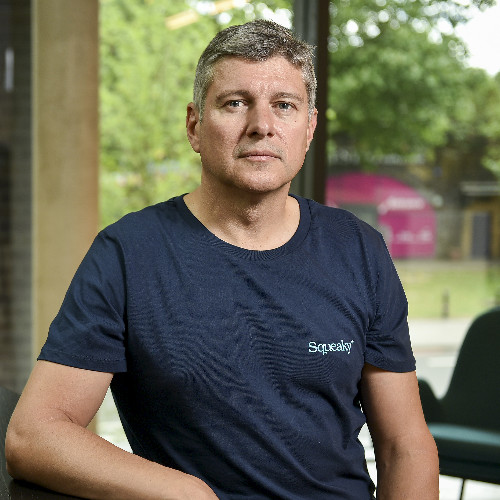“I don’t think many businesses understand the difference between clean energy and all the other greenwashing variants. There are so many myths out there about clean energy and what it means to take responsibility for your climate impacts. It’s also worth noting that clean energy doesn’t cost a lot more than fossil fuel energy (+1% max) and in some cases it can be less expensive.”
Many businesses and organisations have now made important commitments to reduce their carbon emissions. One key part of this is to pivot away from suppliers who use carbon-based energy sources to those who offer green energy.
Yet, as many executives have discovered this is often a complex process. make the wrong decision and you run the risk of a PR disaster and accusations of greenwashing.
One startup looking to address these issues is Squeaky, a B2B marketplace for clean energy that enables corporate and public sector organisations to buy clean electricity directly from wind, solar and hydro generators.
Here the company’s founder Chris Bowden talks about;
* the differences between clean and renewable energy
* how if businesses choose the wrong suppliers they can run the risk of greenwashing
* how some c-suite executives have made unrealistic and somewhat outlandish net-zero pledges – and what companies will need to do to meet them.
What was the inspiration for the creation of Squeaky? And explain a little about the problem you set up to solve?
Back in 2005, we had the idea of buying power directly from a wind farm. Over the following years we developed what became a corporate PPA (power purchase agreement) and we closed our first transaction in 2008 with Sainsbury. This was – to my knowledge – the world’s first-ever corporate PPA. Roll on many years and corporate PPAs are now one of the main ways large corporations like Google and Apple buy their energy. However unfortunately these arrangements are still very complex, the transactions are typically very large, the deal costs are extremely high as is the failure rate.
We set up Squeaky Clean Energy to make it easier for companies to buy power this way by simplifying, standardising and shrinking the arrangements and allowing us to build a marketplace for corporate PPAs. This means many more companies and generators can enter the market thereby increasing the demand and liquidity. As a result, we pioneered another first by allowing a group of 22 universities to aggregate their demand and enabling them to buy clean energy from a wind farm.
And how have the challenges you face changed since you started?
There have of course been many challenges over the years, but one that is front of mind is, of course, the Covid-19 pandemic. Covid-19 has decimated certain industries which has reduced the number of credit-worthy counterparties for corporate PPAs. This has of course impacted the types of companies we can work with.
And what has surprised you in that time? The growth of wind? The way that oil and gas appear to be lingering on?
Nothing ever surprises me anymore in this market. But certainly, I think we’re seeing a confluence of factors that are creating a tipping point towards clean energy and corporate PPAs. This is because technology costs for wind and solar have fallen, power prices have recovered from the Covid lows of 2020, carbon prices have skyrocketed, capital for renewable generation investment is plentiful, generators need to sell power under long term arrangements now the subsidies have gone and companies are scrambling to buy clean energy.
Your business focuses on providing clean energy. What is the difference between clean and renewable energy? Are the two terms interchangeable?
At Squeaky Clean Energy, we use the term clean energy or clean power. This is because clean simply isn’t the same as renewable. Renewable energy according to the EU definition also includes biomass, which has very questionable green credentials. Despite biomass pellets being made from trees, when you consider that all of those pellets are typically manufactured outside of the UK, often in places as far away as North and South America, and given they are then shipped to the UK by fossil fuel-powered boats, that renewable green energy starts to look an awful lot browner.
Some suppliers in the UK actually source energy from fossil fuels and then buy REGOS (or even worse European GOs) and package this up as ‘renewable energy’ for their clients. Imagine claiming that your company has committed to green energy (and maybe you have publicised this too in the media) only to find that you’re buying fossil fuel energy or undermining the UKs support schemes like the Feed in Tariff. That’s a PR disaster waiting to happen for many companies – and yet this is so much more common than you would think. We need to lift the curtain on this.
Do you think businesses have got to the point where execs recognise the need for both clean and cheap energy?
Yes, but I don’t think many understand the difference between clean energy and all the other greenwashing variants. There are so many myths out there about clean energy and what it means to take responsibility for your climate impacts. It’s also worth noting that clean energy doesn’t cost a lot more than fossil fuel energy (+1% max) and in some cases it can be less expensive. To be honest, even if it was 5% more, I would be willing to bet that a purpose-led company wouldn’t consider choosing fossil fuel-based power over clean.

Are we seeing purpose as a key driver for businesses? And who is pushing it? Execs, shareholders – both sides?
Yes. There’s a great deal of research on the positive correlation between purpose and performance. Many executives have realised the need to have an effective ESG strategy to ensure resilience and secure commercial success.
That said some are being hamstrung by their board members and some shareholders who are blinkered by the lure of short-term results and are bound to the belief that companies who focus on ESG issues experience a drag on value creation – Worryingly, PWC’s 2020 Annual Corporate Directors Survey found that only 38% of board members think ESG issues have a financial impact on a company.
In addition, many c-suite executives have made unrealistic and somewhat outlandish net zero pledges, which will still need to be met long after they have left the company. Creating a poisoned chalice for future leaders is neither helpful nor ethical.
Do you think the UK govt is on track to fulfil its carbon emissions pledges? Should it be doing more, if so what?
Governments change, so it’s essential that all our elected representatives (politicians and their parties) are united in solving the problem of climate change in the long run. This means any pledges or targets made right now by the Government must be measurable and achievable. What I mean by that is that they must not be politically motivated to score points with voters and leave future Governments with a poisoned chalice.
I think what we need to remember here is that climate change is a complex issue and it’s going to take a monumental effort on the part of many future Governments, companies, and indeed, individuals to solve. We all have our part to play.
The Government’s widely expected new pledge to reduce emissions by 78% by 2035 compared to 1990 levels is ambitious. But that being said, I do believe it is achievable, especially if the policies and incentives provide the right long-term guidance for investors, companies and people to make the right choices. And the right choice means creating long-term incentives to invest in climate mitigation technologies like clean energy, EVs, energy efficiency and clean heating. Government departments and public sector bodies should also show leadership by switching to 100% clean energy themselves too.
And what technological innovations should investors/stakeholders be keeping an eye on?
Electric Vehicles: I think we are going to see exponential growth in the number of EVs and what is important to consider is the fact that they are way more efficient than petrol or diesel cars – EVs convert over 77% of the electrical energy from the grid to power at the wheels while conventional gasoline vehicles only convert about 12%–30% of the energy stored in gasoline to power at the wheels. By shifting to EVs we not only reduce our consumption of fossil fuels we also make the energy system more efficient.
Large scale storage UK: There has been a lot of investor interest in storage; legislation to allow projects of over 50MW capacity to bypass the Nationally Significant Infrastructure Project planning status has had a big impact. The battery storage pipeline in the UK has reached over 14.5GW with around 1.2GW operational.
Mini nuclear: A nine-member consortium led by engineering companies Rolls-Royce, Laing O’Rourke and Atkins want to build up to 16 small modular reactor (SMR) power stations by 2050.
Digitalisation: The grid of the future is going to have millions of connected devices including your car. It’s not going to be possible to manage and control these devices without IOT, Big Data, AI and 5G. The energy system of the future is going to be very different to the one we have today.
Finally what’s next for Squeaky?
We are at an inflexion point in the UK and we expect to grow fast over the next few years as the demand for clean energy and corporate PPAs expands. We’re also developing better systems and processes to ensure our clients can trace the source of their energy to specific projects and we’re also rolling out technology that can automate the entire life cycle of energy data management including predicting energy consumption and cost, pricing energy and other charges at every interval and reconciling this data to actual consumption and industry dataset. We’re also looking at how we take the Squeaky marketplace into other European markets. It’s going to be an exciting year ahead.




